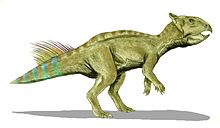Cerasinops
| Cerasinops Temporal range: Late Cretaceous, | |
|---|---|

| |
| Mounted skeleton | |
| Scientific classification | |
| Domain: | Eukaryota |
| Kingdom: | Animalia |
| Phylum: | Chordata |
| Clade: | Dinosauria |
| Clade: | †Ornithischia |
| Family: | †Leptoceratopsidae |
| Genus: | †Cerasinops Chinnery & Horner, 2007 |
| Species: | †C. hodgskissi |
| Binomial name | |
| †Cerasinops hodgskissi Chinnery & Horner, 2007 | |
Cerasinops (meaning 'cherry face') was a small ceratopsian dinosaur. It lived during the Campanian of the late Cretaceous Period.[1] Its fossils have been found in Two Medicine Formation, in Montana. The type species of the genus Cerasinops is C. hodgskissi.

Cerasinops was named and described by Brenda Chinnery and Jack Horner in 2007 from a specimen (MOR 300) almost 80% complete,[2] indicating a total body length of 2.5 m (8.2 ft) and a body mass of 175 kg (386 lb).[3] It belonged to the Ceratopsia (the name is Ancient Greek for 'horned face'), a group of herbivorous dinosaurs with parrot-like beaks that throve in North America and Asia during the Cretaceous Period. Within this group, it has been placed as a basal member of Neoceratopia, although the description is variable; at one point, it is explicitly assigned to Leptoceratopsidae, but in others, it is considered a sister taxon to Leptoceratopsidae, or as a neoceratopsian in general.[2]
See also
References
- ^ "Missing Link" Dinosaur Discovered in Montana, a National Geographic article; the photographed skeleton is actually from Montanoceratops.
- ^ a b Chinnery, Brenda J.; Horner, John R. (2007). "A new neoceratopsian dinosaur linking North American and Asian taxa". Journal of Vertebrate Paleontology. 27 (3): 625–641. doi:10.1671/0272-4634(2007)27[625:ANNDLN]2.0.CO;2.
- ^ Paul, Gregory S. (2016). The Princeton Field Guide to Dinosaurs. Princeton University Press. p. 278. ISBN 978-1-78684-190-2. OCLC 985402380.




